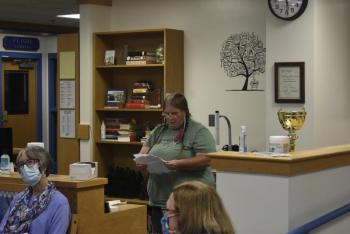Over a dozen people attended the Aug. 11 Boothbay-Boothbay Harbor Community School District school committee meeting in support of two education technician I’s whose contracts were not renewed. In the days following the meeting, Alternative Organizational Structure 98 Superintendent Robert Kahler declined to name the two, who were unnamed at the meeting, or to share any information on the situation. He cited personnel issues he said are not public information.
Kahler said all roles at the CSD and AOS 98 are deeply respected. However, he did share the 2020-2021 school directory which, when compared with this year’s directory, showed the only ed tech I’s not returning are Roberta Blaney and Earl Brewer, both from the special ed composite room. Blaney confirmed she is one of the two ed techs in question, but declined further comment. Brewer did not respond to the Boothbay Register.
Former special education teacher Toby LeConte, a 45-year veteran in her field, said when ed techs were hired in the past, the only candidates who have applied or who were best fit for the job were ed tech I's who are expected to fulfill 45 hours of training every five years specific to children they work with.
“As a taxpayer, I have serious concerns about what you are doing as a school board when plenty of people can't find any employees especially good ones. Ed tech I's are valuable … and ed tech I’s employed in the composite room also take on many different types of duties because of the life skills component and the individual education plan.”
LeConte read from a list of duties performed by the two ed techs with whom she spent just under a decade teaching alongside: Pick up and delivery, bus behaviors, dressing and undressing, toilet training, storage and organization of materials and items, personal hygiene including sanitary and shaving, showering, eating and introduction of new foods, setting a table, table manners, feeding tubes and pumps, standers and gait trainers, seizures and diabetic care, allergies, medication needs, hearing aids, follow-through with therapy exercises, speech and language, basic signing, and communications systems; positive social and emotional challenges; mainstreaming appropriate behaviors, outcomes and success; restaurant ordering, money management, simple form; and academics like basic reading, writing, math, money and time, calendar skills, basic computer, current events, famous landmarks, American music and basic interest about space.
“(It’s) enough so that these individuals can be involved in the daily understanding or conversation in and around the community … That (also) includes family tragedies, how to go about doing those, thank-you notes and writing …,” LeConte continued.
These skills and much more need to be taught in a classroom with diverse levels of ability at just about every age, said LeConte. When students approach the end of their academic career at BRHS, they need to be ready for the job market and all the tasks and chores expected of adults in society, she said.
“It's a long list, yes. It's not complete, but with the help of ed tech I's, students have been able to continue to meet their goals.”
LeConte closed by asking why the ed techs, with all the skills they already have, were not encouraged to complete Central Maine Community College’s ed tech III program which would ensure certification by June. The CSD has made many exceptions in the past with veteran employees and with new hires, she said.
“It may be a different superintendent, but mostly we have the same school committee who knows all about that.”
Nicole Blake said her autistic son Zander has benefited from the CSD's special education program for the past six years. Blake, a member of the military, said ed techs are to education like sergeants are to the military: They are the backbone. Blake also said being a mother, sister and aunt to people with varying disabilities, she has seen the successes and failings of many programs and the CSD’s is like no other.
“Many of these children need daily structure and trust before they are willing to work with anyone. These positions have been providing that for six years … working after hours and much more. Another phrase you'll hear in the military: 'Duties above their paygrade.' These are people who volunteer their own time to spend with our kids.”
Carol DiPrima's son John graduated from the program last year and she described the departure of the ed techs as a tragedy and betrayal of the “respect, honor and value” she believes the district owes them. DiPrima said the ed techs always taught John and his classmates according to their individual challenges, blending the students together for a diverse educational and social experience which leads to lasting friendships and a sense of inclusion in society.
“(This) is extremely important for these children … This is what experience means: Whole-hearted, responsible, obviously invested were the two ed tech I's I am familiar with.”


.JPG)





























